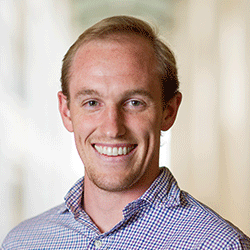
Alumnus Niall Cochrane, ND ’14 recently delivered a presentation on his experience as a first year medical student at Georgetown University. “Use your resources here at Notre Dame, especially Father Foster,” he advised a room of undergraduates preparing to apply to medical school.

Cochrane shared a few of the questions he was asked during his interview at Georgetown University:
1. He was asked, “Why medicine?” He advised students to have something that is unique to them and to talk about why they want to become a doctor.
2. The admissions counselors will also likely ask something like, “Why Georgetown?”
3. Next, they may ask, “What extracurricular activities have you been involved in?” This is a big part of the application process, and students with clinical research will have an advantage. If you can find these clinical research opportunities you can talk about your experience working with patients.
4. The admissions counselors will also probably ask an ethical question that will make applicants think.
5. Lastly, they may ask something like, “If you could make a change to healthcare what would it be?”
According to Cochrane, his interview experience was very conversational. “Most people who get into Georgetown are waitlisted. The admissions committee wants to see how bad you want to go to Georgetown. Update them with letters. Throw all pride aside. Do whatever you can to get in.”
As for the academics in medical school, below is a breakdown of what each year will consist of in terms of workload:
In the first year, there will be tests every 2-3 weeks.
In the second year, there will be tests every quarter.
In the third and fourth year, students will complete clinical clerkships that change every month.
“In a lot of medical schools you rotate through one hospital. At Georgetown, it’s different. Students rotate between Georgetown Hospital, GW, hospitals in Virginia, and it’s cool because different hospitals are good at different things,” Cochrane said.
Georgetown is divided into five different learning societies which are then subdivided into academic families. The university also offers a student mentorship program (GSMP) where students are paired with a mentor from the M2 class.
Another perk of attending the university is the opportunity to work in the HOYA Clinic, a student-run free clinic in DC. The clinic attends to thousands of patients regardless of their ability to pay, insurance status, or immigration status. The experience aims to educate and empower students on the socioeconomic inequalities that manifest themselves as health disparities.